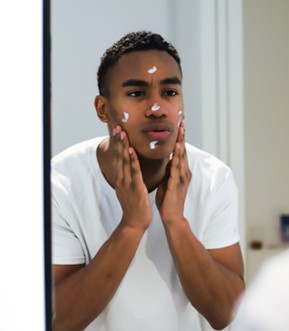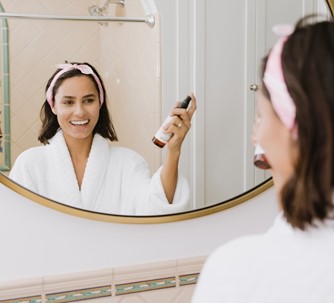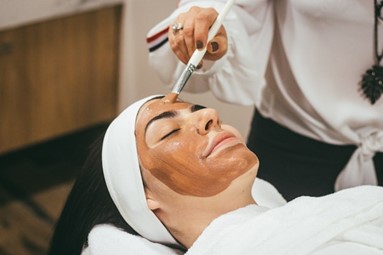Amalia Utz is a nursing professional with experience in exercise physiology, stroke and cardiac rehab and home health care. With an interest in aesthetics and cosmetology, Amalia Marie Utz explores some of the most common skin concerns, from acne to aging, highlighting effective treatments to address them.
Our skin, the body’s largest organ, plays a crucial role in protecting us from environmental hazards such as UV radiation, pollutants, and pathogens. It serves as a vital barrier, shielding our internal organs from harm and regulating temperature and moisture levels to maintain homeostasis. Despite its resilience, our skin is not invincible and is susceptible to a myriad of concerns that can compromise its health and appearance. Factors such as exposure to UV rays, pollution, stress, hormonal fluctuations, and genetics can contribute to various skin issues, including acne, dryness, inflammation, hyperpigmentation, and premature aging. Additionally, lifestyle choices such as diet, skincare routines, and habits like smoking or excessive sun exposure can also impact the condition of our skin. Understanding the complexities of skin health and the factors that influence it is essential for implementing effective skincare practices and addressing common concerns.
Amalia Utz Remarks on Treating Acne
Acne is a common skin condition characterized by the presence of pimples, blackheads, and whiteheads, often occurring on the face, neck, chest, and back. It occurs when hair follicles become clogged with oil and dead skin cells, leading to inflammation and the formation of blemishes. Acne can be triggered by hormonal changes, genetics, stress, and certain medications.
Treatment Options for Acne

Topical Treatments
Over the counter and prescription topical treatments containing ingredients such as benzoyl peroxide, salicylic acid, and retinoids can help unclog pores, reduce inflammation, and prevent new breakouts. Amalia Marie Utz explains that these treatments are available in various forms, including gels, creams, and cleansers.
Oral Medications
In severe cases of acne, oral medications such as antibiotics, hormonal therapies, and isotretinoin (Accutane) may be prescribed by a dermatologist. These medications work internally to target the underlying causes of acne and reduce inflammation.
Professional Treatments
Utz says that dermatological procedures such as chemical peels, microdermabrasion, and laser therapy can help improve the appearance of acne-prone skin by exfoliating dead skin cells, reducing oil production, and promoting collagen production. These treatments are typically performed in a dermatologist’s office and may require multiple sessions for optimal results.
Addressing Hyperpigmentation
Hyperpigmentation refers to areas of the skin that become darker than the surrounding tissue due to an overproduction of melanin, the pigment responsible for skin color. Common causes of hyperpigmentation include sun exposure, hormonal changes, inflammation, and skin injuries.
Treatment Options for Hyperpigmentation
Topical Lightening Agents
Topical treatments containing ingredients such as hydroquinone, kojic acid, vitamin C, and niacinamide can help fade dark spots and even out skin tone by inhibiting melanin production and promoting cell turnover. These treatments are available in serums, creams, and lotions.
Chemical Peels
Chemical peels involve the application of a chemical solution to the skin, which exfoliates the outer layer and promotes the growth of new, evenly pigmented skin cells. Amalia Marie Utz explains that different types of peels, such as glycolic acid, lactic acid, and trichloroacetic acid (TCA), can be customized based on the severity of hyperpigmentation.
Laser Therapy
Mali Marie Utz notes that laser treatments, such as intense pulsed light (IPL) therapy and fractional laser resurfacing, can target and break up excess melanin in the skin, leading to a more uniform complexion. These treatments are typically performed by dermatologists or trained skincare professionals and may require multiple sessions for optimal results.
Combatting Signs of Aging
As we age, our skin undergoes changes that can result in wrinkles, fine lines, sagging, and loss of elasticity. These signs of aging are influenced by factors such as genetics, sun exposure, smoking, and lifestyle habits.
Treatment Options for Aging Skin

Topical Retinoids
Retinoids, derivatives of vitamin A, are powerful anti-aging ingredients that can help improve the appearance of fine lines, wrinkles, and uneven texture by stimulating collagen production and promoting cell turnover. These treatments are available in prescription-strength formulations and over-the-counter products.
Dermal Fillers
Injectable dermal fillers containing hyaluronic acid, collagen, or synthetic compounds can help restore lost volume, smooth out wrinkles, and enhance facial contours. Mali Marie Utz says that these treatments are typically administered by dermatologists or cosmetic surgeons and provide immediate results with minimal downtime.
Microdermabrasion
Microdermabrasion is a non-invasive exfoliation technique that uses a specialized device to gently remove the outer layer of dead skin cells, revealing smoother, more youthful-looking skin underneath. This treatment can help improve the appearance of fine lines, wrinkles, and sun damage with minimal discomfort and downtime.
Conclusion
Mali Marie Utz remarks that from acne to aging, our skin is susceptible to a variety of concerns that can impact its health and appearance. Fortunately, there are many effective treatments available to address these concerns and help us achieve clear, radiant, and youthful-looking skin. By understanding the underlying causes of common skin issues and exploring the available treatment options, we can take proactive steps to maintain healthy, beautiful skin at every age.









